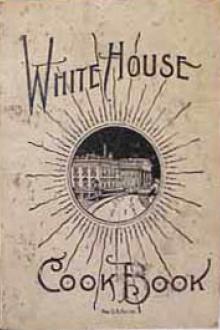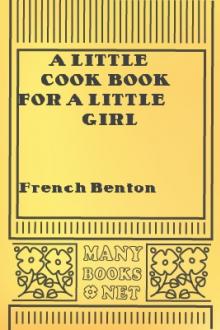The Whitehouse Cookbook (1887), Hugo Ziemann [world of reading .TXT] 📗

- Author: Hugo Ziemann
- Performer: -
Book online «The Whitehouse Cookbook (1887), Hugo Ziemann [world of reading .TXT] 📗». Author Hugo Ziemann
RULE FOR UNDER CRUST.
A good rule for pie crust for a pie requiring only an under crust, as a custard or pumpkin pie, is: Three large tablespoonfuls of flour sifted, rubbing into it a large tablespoonful of cold butter, or part butter and part lard, and a pinch of salt, mixing with cold water enough to form a smooth, stiff paste, and rolled quite thin.
PLAIN PIE CRUST.
Two and a half cupfuls of sifted flour, one cupful of shortening, half butter and half lard cold, a pinch of salt, a heaping teaspoonful of baking powder sifted through the flour. Rub thoroughly the shortening into the flour. Mix together with half a teacupful of cold water, or enough to form a rather stiff dough; mix as little as possible, just enough to get it into shape to roll out; it must be handled very lightly. This rule is for two pies.
When you have a little pie crust left do not throw it away; roll it thin, cut in small squares and bake. Just before tea put a spoonful of raspberry jelly on each square.
PUFF PASTE OF SUET.
Two cupfuls of flour, one-half teaspoonful of salt, one teaspoonful of baking powder, one cup of chopped suet, freed of skin, and chopped very fine, one cupful of water. Place the flour, sifted with the powder in a bowl, add suet and water; mix into smooth, rather firm dough.
This paste is excellent for fruit puddings and dumplings that are boiled; if it is well made, it will be light and flaky and the suet impreceptible. It is also excellent for meat pies, baked or boiled. All the ingredients should be very cold when mixing, and the suet dredged with flour after it is chopped, to prevent the particles from adhering to each other.
POTATO CRUST.
Boil and mash a dozen medium-sized potatoes, add one good teaspoonful of salt, two tablespoonfuls of cold butter and half a cupful of milk or cream. Stiffen with flour sufficient to roll out. Nice for the tops of meat pies.
TO MAKE PIE CRUST FLAKY.
In making a pie, after you have rolled out your top crust, cut it about the right size, spread it over with butter, then shake sifted flour over the butter, enough to cover it well. Cut a slit in the middle place it over the top of your pie, and fasten the edges as any pie. Now take the pie on your left hand and a dipper of cold water in your right hand; tip the pie slanting a little, pour over the water sufficiently to rinse off the flour. Enough flour will stick to the butter to fry into the crust, to give it a fine, blistered, flaky look, which many cooks think is much better than rolling the butter into the crust.
TARTLETS. No. 1.
Tarts of strawberry or any other kind of preserves are generally made of the trimmings of puff paste rolled a little thicker than the ordinary pies; then cut out with a round cutter, first dipped in hot water, to make the edges smooth, and placed in small tart-pans, first pricking a few holes at the bottom with a fork before placing them in the oven. Bake from ten to fifteen minutes. Let the paste cool a little; then fill it with preserve. By this manner, both the flavor and color of the jam are preserved, which would be lost were it baked in the oven on the paste; and, besides, so much jam is not required.
TARTLETS. No. 2.
Tartlets are nice made in this manner: Roll some good puff paste out thin, and cut it into two and a half inch squares; brush each square over with the white of an egg, then fold down the corners, so that they all meet in the middle of each piece of paste; slightly press the two pieces together, brush them over with the egg, sift over sugar and bake in a nice quick oven for about a quarter of an hour. When they are done, make a little hole in the middle of the paste and fill it up with apricot jam, marmalade, or red currant jelly. Pile them high in the centre of a dish on a napkin and garnish with the same preserves the tartlets are filled with.
PATTIES, OR SHELLS FOR TARTS.
Roll out a nice puff paste thin; cut out with a glass or cookie-cutter and with a wine-glass or smaller cutter, cut out the centre of two out of three; lay the rings thus made on the third, and bake at once. May be used for veal or oyster patties, or filled with jelly, jam or preserves, as tarts. Or shells may be made by lining patty-pans with paste. If the paste is light, the shells will be fine. Filled with jelly and covered with meringue (tablespoonful of sugar to the white of one egg) and browned in oven, they are very nice to serve for tea.
If the cutters are dipped in hot water, the edges of the tartlets will rise much higher and smoother when baking.
TARTS.
Larger pans are required for tarts proper, the size of small, shallow pie-tins; then after the paste is baked and cooled and filled with the jam or preserve, a few stars or leaves are placed on the top, or strips of paste, criss-crossed on the top, all of which have been previously baked on a tin by themselves.
Dried fruit, stewed until thick, makes fine tart pies, also cranberries stewed and well sweetened.
GREEN APPLE PIE.
Peel, core and slice tart apples enough for a pie; sprinkle over about three tablespoonfuls of sugar, a teaspoonful of cinnamon, a small level tablespoonful of sifted flour, two tablespoonfuls of water, a few bits of butter, stir all together with a spoon; put it into a pie-tin lined with pie paste; cover with a top crust and bake about forty minutes.
The result will be a delicious, juicy pie.
APPLE CUSTARD PIE. No. 1.
Three cupfuls of milk, four eggs and one cupful of sugar, two cupfuls of thick stewed apples, strained through a colander. Beat the whites and yolks of the eggs lightly and mix the yolks well with the apples, flavoring with nutmeg. Then beat into this the milk and, lastly, the whites. Let the crust partly bake before turning in this filling. To be baked with only the one crust, like all custard pies.
APPLE CUSTARD PIE. No. 2.
Select fair sweet apples, pare and grate them, and to every teacupful of the apple add two eggs well beaten, two tablespoonfuls of fine sugar, one of melted butter, the grated rind and half the juice of one lemon, half a wine-glass of brandy and one teacupful of milk; mix all well and pour into a deep plate lined with paste; put a strip of the paste around the edge of the dish and bake thirty minutes.
APPLE CUSTARD PIE. No. 3.
Lay a crust in your plates; slice apples thin and half fill your plates; pour over them a custard made of four eggs and one quart of milk, sweetened and seasoned to your taste.
APPLE CUSTARD PIE. No. 4.
Peel sour apples and stew until soft, and not much water left in them; then rub through a colander; beat three eggs for each pie to be baked and put in at the rate of one cupful of butter and one of sugar for three pies; season with nutmeg.
IRISH APPLE PIE.
Pare and take out the cores of the apples, cutting each apple into four or eight pieces, according to their size. Lay them neatly in a baking dish, seasoning them with brown sugar and any spice, such as pounded cloves and cinnamon, or grated lemon peel. A little quince marmalade gives a fine flavor to the pie. Add a little water and cover with puff paste. Bake for an hour.
MOCK APPLE PIE.
Crush finely with a rolling pin, one large Boston cracker; put it into a bowl and pour upon it one teacupful of cold water; add one teacupful of fine white sugar, the juice and pulp of one lemon, half a lemon rind grated and a little nutmeg; line the pie-plate with half puff paste, pour in the mixture, cover with the paste and bake half an hour.
These are proportions for one pie.
APPLE AND PEACH MERINGUE PIE.
Stew the apples or peaches and sweeten to taste. Mash smooth and season with nutmeg. Fill the crusts and bake until just done. Put on no top crust. Take the whites of three eggs for each pie and whip to a stiff froth, and sweeten with three tablespoonfuls of powdered sugar. Flavor with rose-water or vanilla; beat until it will stand alone; then spread it on the pie one-half to one inch thick; set it back into the oven until the meringue is well "set." Eat cold.
COCOANUT PIE. No. 1.
One-half cup desiccated cocoanut soaked in one cupful of milk, two eggs, one small cupful of sugar, butter the size of an egg. This is for one small-sized pie. Nice with a meringue on top.
COCOANUT PIE. No. 2.
Cut off the brown part of the cocoanut, grate the white part, mix it with milk and set it on the fire and let it boil slowly eight or ten minutes. To a pound of the grated cocoanut, allow a quart of milk, eight eggs, four tablespoonfuls of sifted white sugar, a glass of wine, a small cracker, pounded fine, two spoonfuls of melted butter and half a nutmeg. The eggs and sugar should be beaten together to a froth, then the wine stirred in. Put them into the milk and cocoanut, which should be first allowed to get quite cool; add the cracker and nutmeg, turn the whole into deep pie plates, with a lining and rim of puff paste. Bake them as soon as turned into the plates.
CHOCOLATE CUSTARD PIE. No. 1.
One-quarter cake of Baker's chocolate, grated; one pint of boiling water, six eggs, one quart of milk, one-half cupful of white sugar, two teaspoonfuls of vanilla. Dissolve the chocolate in a very little milk, stir into the boiling water and boil three minutes. When nearly cold beat up with this the yolks of all the eggs and the whites of three. Stir this mixture into the milk, season and pour into shells of good paste. When the custard is "set"—but not more than half done—spread over it the whites whipped to a froth, with two tablespoonfuls of sugar. You may bake these custards without paste, in a pudding dish or cups set in boiling water.
CHOCOLATE PIE. No. 2.
Put some grated chocolate into a basin and place on the back of the stove and let it melt (do not add any water to it); beat one egg and some sugar in it; when melted, spread this on the top of a custard pie. Lovers of chocolate will like this.
LEMON PIE. No. 1. (Superior.)
Take a deep dish, grate into it the outside of the rind of two lemons; add to that a cup and a half of white sugar, two heaping tablespoonfuls of unsifted flour, or one of cornstarch; stir it well together, then add the yolks of three well-beaten





Comments (0)